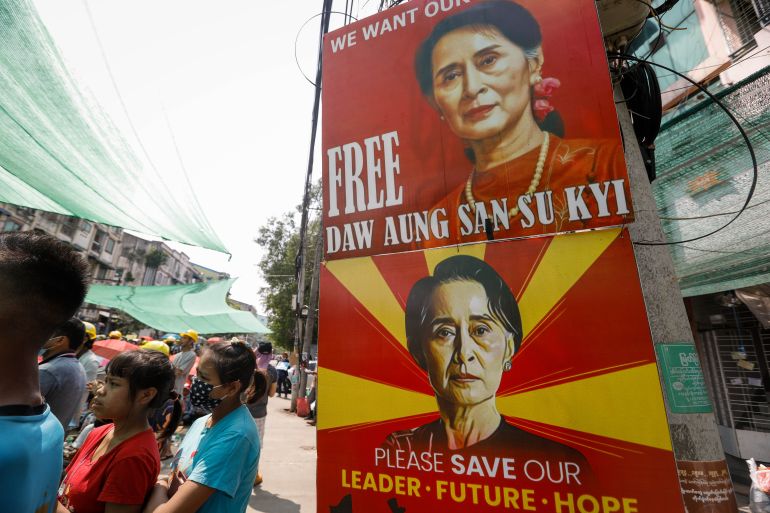Myanmar court delays verdicts in Aung San Suu Kyi’s trial
Verdicts widely expected to deliver Nobel laureate’s first prison sentences since her military overthrew postponed to December 6.

A court in Myanmar has delayed the first verdicts in the trial of deposed leader Aung San Suu Kyi until early December.
The Nobel Peace Prize winner has been detained since the military seized power in a February 1 coup after her National League for Democracy (NLD) party won a landslide re-election in November 2020.
Keep reading
list of 4 items‘I won’t serve’: Myanmar people plan exit to escape military draft
Myanmar’s rebels see unity as key to victory over weakened military rulers
Concerns raised over Myanmar’s ailing Aung San Suu Kyi
The court in the capital, Naypyidaw, was expected to rule on Tuesday on charges of incitement and violating COVID-19 restrictions. Aung San Suu Kyi faces two years in prison for the incitement charge, in relation to anti-coup statements released by the NLD when she was already being held incommunicado in military custody.
She is also accused of violating the Natural Disaster Management Law for violating crowd restrictions by attending a campaign rally last year when she waved to a convoy of supporters passing by her house.
The 76-year-old is facing a raft of other charges, including unsubstantiated allegations of corruption and election rigging that could see her jailed for the rest of her life.
Deposed President Win Myint and Naypyidaw Mayor Myo Aung are also defendants in the incitement case, with the former also facing his own accusations of violating COVID-19 restrictions.
The postponed verdicts have been rescheduled for December 6, when Aung San Suu Kyi was also expected to hear a verdict for two charges related to illegally possessing walkie-talkies.
It was not immediately clear what was the reason for the postponements, or if the walkie-talkie verdicts would still be delivered as scheduled, but observers are united in believing guilty verdicts are virtually guaranteed for all charges.
“Myanmar’s courts are still tightly beholden to the military so even though they postponed the announcement, a guilty verdict is widely expected,” said Phil Robertson, deputy director of Human Rights Watch’s Asia division.
Prominent Myanmar activist or protest organiser Thinzar Shunlei Yi told Al Jazeera the delay was a “usual tactic” to avoid tension and stall for time because the military authorities are “afraid to eventually sentence her”.
Once an international icon of democracy and human rights, Aung San Suu Kyi spent many years under house arrest between her political debut in 1988 and her final release in 2010.
After taking office in 2016, her international reputation was tarnished by repeated scandals, even as her domestic popularity continued to soar. Most notably, she refused to speak out against alleged military atrocities against the Rohingya minority, going as far as to personally deny accusations of genocide at the International Court of Justice in 2019.
But even those who previously criticised her perceived shortcomings, like Robertson, have dismissed the charges against her as “bogus” and “politically motivated”.
Information from Aung San Suu Kyi’s trials has become increasingly scarce after the military government imposed a gag order on her entire legal team, threatening the lawyers with legal action if they speak to the press.
“This trial has been a travesty of justice since day one, with fair trial procedures dumped to the wayside, defence counsel gagged, and public access non-existent,” Robertson said.
Massive protests broke out following the coup, but have since dwindled in the face of a brutally violent military crackdown, which is believed to have killed more than 1,000 civilians. Still, flash protests were seen on the streets of the main city of Yangon while the hearing was under way in Naypyidaw.
A parallel National Unity Government (NUG) was appointed by parliamentarians elected in the 2020 polls, which has since been locked in a struggle with the military government for international recognition.
Prior to Tuesday’s delay, NUG spokesman Dr Sasa told Al Jazeera the trial “has nothing to do with the rule of law” and is part of the “military reign of terror”.